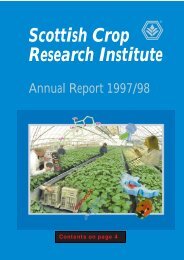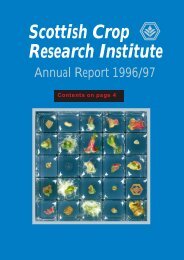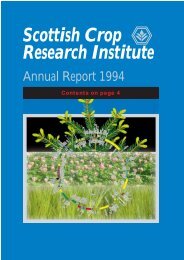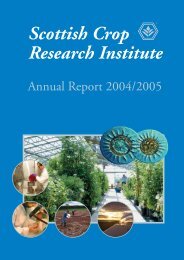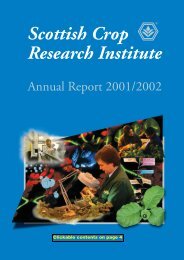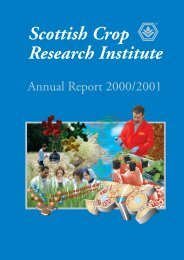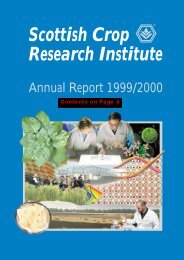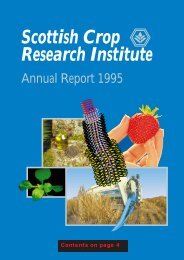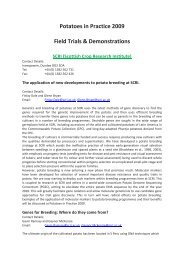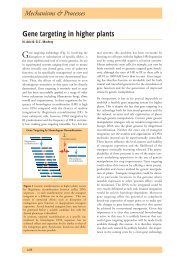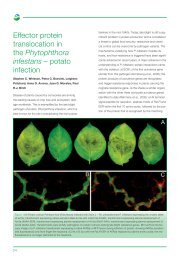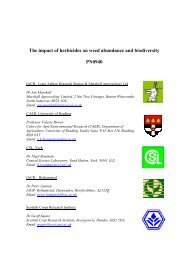PDF file: Annual Report 2002/2003 - Scottish Crop Research Institute
PDF file: Annual Report 2002/2003 - Scottish Crop Research Institute
PDF file: Annual Report 2002/2003 - Scottish Crop Research Institute
You also want an ePaper? Increase the reach of your titles
YUMPU automatically turns print PDFs into web optimized ePapers that Google loves.
<strong>Research</strong> services<br />
Analytical facilities<br />
C.M. Scrimgeour<br />
Organic Mass Spectrometry. SCRI currently has<br />
six mass-spectrometers interfaced to gas or liquid<br />
chromatographs for sample separation. The Hewlett<br />
Packard 5989B MS ENGINE GC-MS is a researchgrade<br />
quadrupole instrument with electron impact,<br />
chemical (positive/negative) ionisation modes and a<br />
mass range of 2000 amu. Distributed processing software<br />
permits off-line data processing and reduces<br />
analysis times. This instrument can provide mass and<br />
structural data on a wide range of organic compounds.<br />
The analysis of volatile compounds uses a Markes<br />
International Unity and dual Ultra automated thermal<br />
desorption system (ATD) linked to a VG TRIO-<br />
1000 quadrupole gas chromatograph-mass<br />
spectrometer and permits detailed characterisation of<br />
pro<strong>file</strong>s of organic volatiles generated by biological<br />
systems. The most recently purchased GC-MS instrument<br />
is a ThermoQuest TEMPUS-TOF, capable of<br />
rapid detection, characterisation and quantification in<br />
fast GC separations. The design provides parallel mass<br />
analysis with a short duty cycle at high transmission.<br />
This delivers rapid acquisition and fast sampling of<br />
narrow peaks at high sensitivity with high sample<br />
throughput suitable for metabolite profiling.<br />
The Finnigan SSQ 710C dedicated liquid chromatography-MS<br />
instrument, with atmospheric pressure<br />
chemical ionisation (APCI) and electrospray ionisation<br />
(ESI) interfaces is suitable for samples whose high<br />
molecular weight, lack of volatility or polarity, make<br />
HPLC the preferred separation method. The multicharge<br />
ionization mechanism of electrospray can<br />
extend the basic 2000 mass range of the instrument by<br />
a factor of about 20, giving a mass range of greater<br />
than 40,000 amu, suitable for protein analysis. Two<br />
ThermoQuest LCQ-DECA, ultra sensitive ion-trap<br />
LC-MS n systems are capable of many more scan functions<br />
than the SSQ710C spectrometer, including<br />
data-dependent full scan MS/MS, a tool of great utility<br />
in high throughput profiling.<br />
Isotope ratio mass spectrometry. SCRI is equipped<br />
with modern instrumentation for stable isotope analysis<br />
of the biologically important light elements, 13 C,<br />
15 N, and 18 O in a wide range of solid, liquid and gas<br />
samples. All the instrumentation is based on continuous-flow<br />
isotope-ratio-mass spectrometers that are<br />
fully automated and operated through computer data<br />
systems, allowing a high through-put of samples,<br />
essential for many biological experiments where large<br />
data sets are required. For solid samples, the Europa<br />
Scientific Tracermass and 20-20 mass spectrometers<br />
are interfaced to Roboprep CN and ANCA-NT SL<br />
combustion sample converters. A Roboprep G+ gas<br />
purification unit is used for gas analysis. Analytical<br />
protocols are devised to minimise sample preparation<br />
and fully exploit the automation.<br />
Gas chromatography. Within the MRS Lipid<br />
Analysis Unit and SCRI, gas chromatographs (HP<br />
5890 and Agilent 6890 systems) are used primarily for<br />
fatty acid, sterol and leaf wax analysis but are also used<br />
for developing separation methods for GC-MS studies.<br />
Laboratory facilities are available for extraction<br />
and derivatisation of a wide range of samples.<br />
Quality assurance. Within SCRI, the Gas<br />
Chromatography-Mass Spectrometry Laboratories,<br />
Stable Isotopes Facility and Lipid Analysis Unit of<br />
MRS Ltd, operate a formal Quality System certified<br />
to BS EN ISO 9001 by SGS Yarsely International<br />
Certification Services Ltd. The certification standard<br />
was upgraded from ISO 9002 to ISO 9001 in August<br />
1999, and now includes the design and conduct of<br />
research within its scope.<br />
Figure 1. ThermoQuest TEMPUS-TOF.<br />
135



